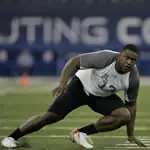
Most football coaches have a set of "Golden Rules" when it comes to what a good offense should or should not do. The fact is there is no unified list. Which is a better ball-control offense? Control the ball with the short passing game or the power running game? Is defense more crucial than offense? While it may be true that if they don't score they can't beat you, it is conversely true that if you don't score you can't win either.
So balance is the answer then? Well, not if your ineptness is balanced. Is surprise the answer? While the element of surprise is always cherished, a team would surely find minimal success if it ran the ball on a majority of third-and-10 plays, and passed deep downfield on every third-and-one.
With that, I stress 10 Golden Rules a good offense should practice:
- Force the defense to defend the entire field. Never allow a defense to crowd the line of scrimmage, stacking eight or 10 men in the box because you are predictable in calling the run. Never allow the defense to flood the zones with extra defenders because you pass eight downs out of 10. The offense should attack all areas of the field and force the defenders to stay at home, thus allowing the offensive coaches to create the basic two-on-one mismatches that lead to success for the offense.
- Establish the running game. Force the defense to respect the running game, taking the teeth out of the pass rush. Then, you open up the passing attack.
- Create a mismatch at the point of attack. Design and run plays to outnumber the defense at the point of attack. Traps, power plays, isolations, leads, options, pick passes, and a host of other plays can be used to create a situation where numerical or size mismatches can be exploited.
- Minimize Mistakes. Turnovers and penalties are avoidable through sound practices and preparation. Few things in the game of football are as demoralizing as giving up a score while your offense is on the field. This momentum shift often changes the course of a game.
- Physically dominate the defense. Being strong and physical on offense is not as important as it is on defense--it is MORE important. A dominant offense can break the other team down physically and mentally. That leads to the offense taking control of the game.
- 1
- of
- 2








Discuss This Article